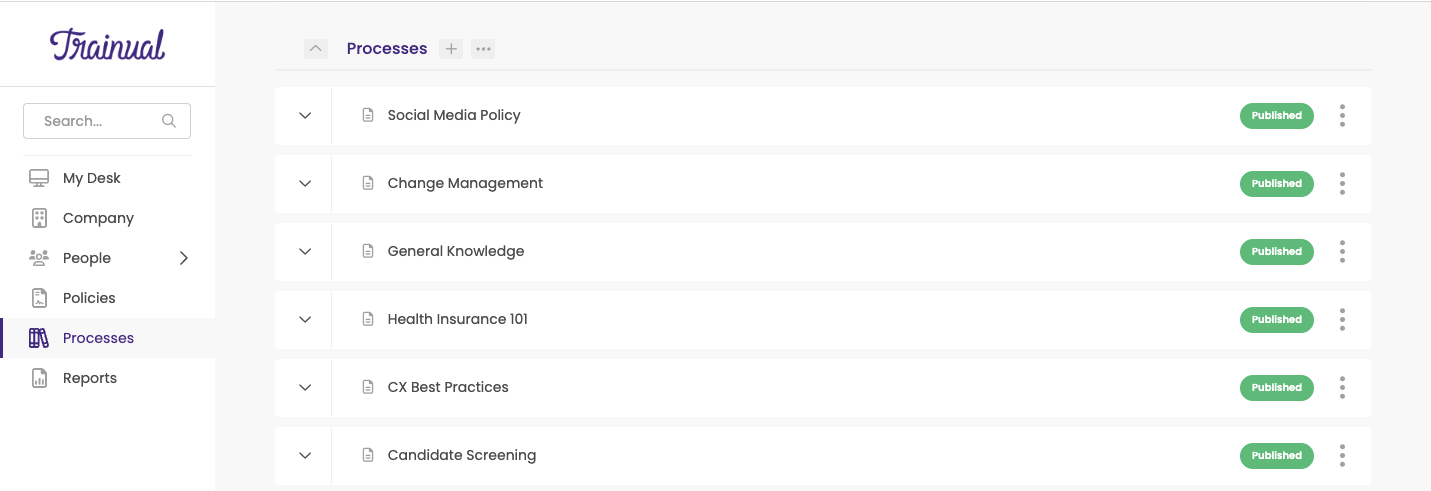
Articles
Want Fast and Furious Sales? Then Your New Hires Need a Sales Training Platform.
May 31, 2022

The right sales training platform can bring your new hires up to speed and prime them for high-performance sales.
As new sales agents join your ranks, it might be tempting to have them hit the ground running ASAP.
However, it’s in both you and your new hires’ best interest to give them access to a comprehensive onboarding experience that sets them up not only for speed but for efficiency.
An ideal sales training platform can help new sales hires learn the ins and outs of their products easily — and remotely.
That’s because every policy, process, and procedure is conveniently accessible on a single platform. With customizable training modules, testing options, accountability capabilities, and performance metrics, they’ll have access to just about everything they need, whenever they need it.
How does it all come together? Let’s explore how a sales training platform can help your new sellers acclimate quickly, feel confident in their roles, and blaze the sales performance trail.
A brief guide to leveling up your hires with a sales training platform.
Regardless of the sector you work in, effective onboarding is effective onboarding.
In the case of sales, there are processes, procedures, and protocols to follow, and a sales training platform can provide access to all of them.
But what about the art of the sale? How do you train your new hires to master the panache it takes to close a deal? The communication strategies and persuasive techniques that separate low performers from your high-performance sellers?
For that, you may want to look beyond a simple sales training platform to learning management software (LMS)-alternative that’s specifically designed with customization in mind.
Features to look for in the best sales training platforms.
There are hundreds (if not thousands) of sales training platforms on the market. If you’re feeling a bit lost about what features or specs to look for or which platform can positively impact your selling team’s performance, here are some features you’ll want to keep in mind:
- Personalization and customization tools.
- Ability to create and auto-assign individual learning plans for each hire.
- Analytics, reporting dashboards, and behind-the-curtain methods of tracking and monitoring performance.
- Place and capacity to showcase your company culture and the competitive sales landscape.
- Gamification features.
- Recertification capabilities and continuous professional development.
Customization and personalization are key.
You know what your sales reps need to build client relationships and successfully close a sale. But each representative will require customized and individualized sales training that accommodates their unique learning style — however that may look. You need a sales training platform that can offer the flexibility to do that.
The capacity for customization and personalization is important, but so is creating engaging training content for your sellers. Engagement can help with information retention, and it makes learning more fun!
Easily accessible training content is a performance asset.
Imagine an extensive and comprehensive content library that’s available to your sales team at any time of the day. With the right sales training platform, you can fill it with current sales collateral, training modules, and past processes and approaches that didn’t work or are now obsolete.

Add to that the statutory updates, addenda, current sales processes, and best practices that are always evolving in sales, and you’ll need a training platform that can accommodate all that and grow with your team.
The option to organize your content and training materials into collections by category (i.e., location, departments, teams, past processes) can make your selling team’s training experience a lot more efficient. Or, even better, create a sales business playbook, specifically for your selling team.
What is a business playbook for sales?
If you’re familiar with the concept of a sports playbook — a book of rules, strategies, and plays that work (or don’t) — then you probably have a general idea of how a sales business playbook works.
A business playbook for sales keeps all of your sales processes, policies, procedures, staffing, roles, and contact information all in one place. For your sales hires, this playbook completely outlines how your sales division (or, business as a whole) operates and includes your history of sales strategies, current approaches, and best practices for making a sale; a view of the competitive landscape; and, of course, your sales team’s differentiators.
How would a business playbook for sales benefit my selling team?
- Every seller has access to the same content, which can create alignment and reduce the time and effort it takes to hunt down a policy or best practice.
- When your sellers have the resources they need to train well, they’re more likely to stay engaged and perform to the best of their ability.
- Your sales operations and approaches become more replicable.
Agile learning is ace.
An agile learning model is a must-have for sales readiness training.
But what does that mean, exactly?
For starters, agility involves easy access to sales training and development content and materials on any device, and from anywhere.
In addition to your new hire’s daily work responsibilities, they should be given ample opportunities to train and learn how to handle any sales scenario that may come their way.
.gif)
In other words, flexibility is key, and so is sales enablement – the process of providing your sales organization with the information, content, and tools that help salespeople sell more effectively. A sales training platform embodies sales enablement because it can equip your sellers with the right tools and resources they need to close a deal and deliver superior performance (i.e. selling faster and better).
Here are some ways you can use a sales training platform to facilitate an agile learning environment that showcases and keeps the focus on sales enablement for your team:
- Point-in-time sales coaching.
- Role-playing various sales scenarios.
- Accommodates real-time or async feedback for better sales performance.
- Access to video presentations from the top performers in the field.
- Interactive capabilities, such as quizzes, tests, and sales practicums.
- Opportunities for top sales performers to collaborate and mentor new sales hires.
If the heart of sales enablement is a focus on knowledge transferability, then think of a sales training platform as the conduit or vehicle for that knowledge, all within the confines of a single platform.
Collaboration is king.
The sales process is anything but a one-person show. A new hire will require training and practice in persuasive techniques and presentation skills. You’ll want to look for a sales training platform that offers collaborative learning capabilities, so your sales team is as prepared (and confident) as possible.
.gif)
What are collaborative learning capabilities?
Collaborative learning capabilities are joint peer-to-peer, or manager-to-sales associate, interactions, and engagement.
This might look like getting your current sales reps to share their best responses to common questions with new hires, or hosting a Q&A session with managers from other departments.
Or it might look like a sales training platform that can give your sales team easy access to the marketing or product development teams, leading to increased understanding and better sales performance.
However you put it into practice, collaboration helps to ensure that your training is relevant, engaging, and up-to-date.
Progress tracking precedes accountability.
There are federal and state laws, statutes, and compliance regulations that affect many sellers across a variety of sectors.
Depending on the type of sales sector you’re a part of, your selling team might need extensive, ongoing training and certifications to continue making sales.
.gif)
To keep a handle on how each sales rep is doing in their training, it’s essential to partner with a training platform that offers progress tracking analytics and monitoring. You’ll also be able to see if the training has been effective and what (if anything) you’ll need to do to improve it in the future.
We’ve compiled a list of some of the features and specs you might look for in a top sales training platform:
- A user-friendly dashboard.
- Test performance insights.
- Sales content completion rate by subject.
- Training completion tracking.
- Insights into trainees’ learning attempts, length of training time, and start and completion rates by individual and group.
Ready to turn your new hires into better sellers with a top training platform?
Mastering the art and science of sales starts with a top sales training platform.
When new and existing hires can access up-to-date policies, sales training processes, selling methodologies, and current contact information for their selling team, they’re more likely to engage and perform at their best.
The right sales training platform will accommodate everything they need, including your company’s mission, value proposition, competitive sales strategies, and sales tribal knowledge. A seller can’t be successful, much less effective, without the tools and training required to make a sale.
Similar Blog Posts





.jpeg)




